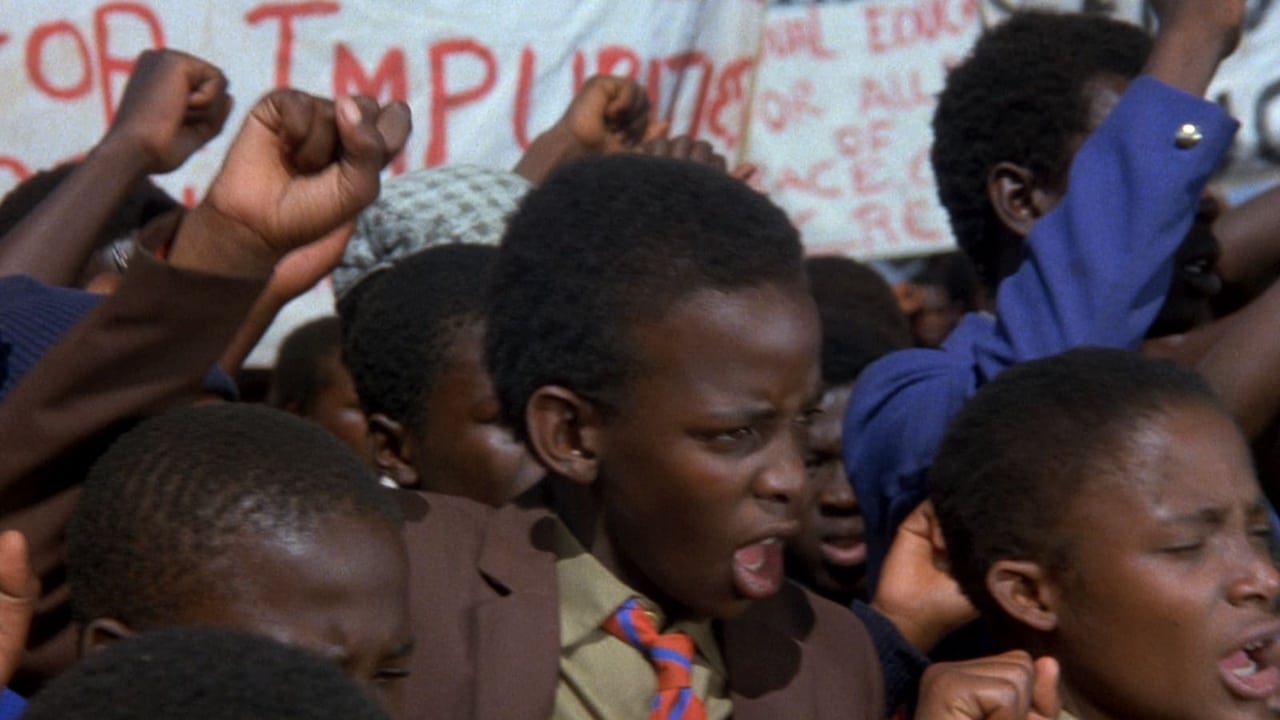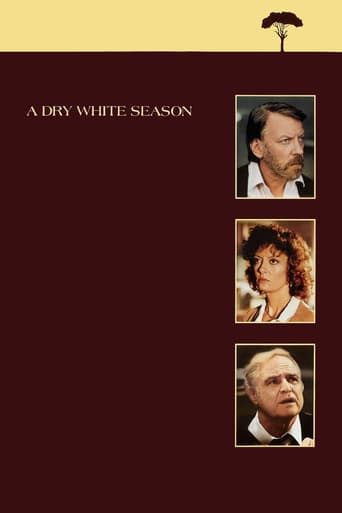Humaira Grant
It’s not bad or unwatchable but despite the amplitude of the spectacle, the end result is underwhelming.
Ava-Grace Willis
Story: It's very simple but honestly that is fine.
l_rawjalaurence
Released in the year before the process of ending apartheid began, A DRY WHITE SEASON offers a straightforward portrayal of life, with the Afrikaaners depicted as almost uniformly racist and the black Africans as their largely innocent victims. The only people straddling this racial and ideological divide are history teacher Ben du Toit (Donald Sutherland) and his young son Johan (Rowen Elmes). At the beginning of the film we see du Toit, a former Springbok rugby union player, happily presiding over his learners at his all-white private school. It is only when he learns of the brutal way in which his African gardener Gordon Ngubene (Winston Ntshona) has been murdered by the authorities that his hitherto fixed beliefs in Afrikaaner supremacy are challenged. After an abortive court case charging the police with brutality, du Toit determines to pursue justice at any cost, even at the cost of his family life.The plot is a familiar one with resonances far beyond the immediate South African context. It could prove equally plausible in an historical drama about the anticommunist era in the United States. We roughly know what will happen in the end, but there are some noteworthy moments along the way, especially Marlon Brando's star turn as a campaigning lawyer where he rehearses his British English accent (previously shown off in the remake of MUTINY ON THE BOUNTY (1962).Most of the supporting roles are played by British actors speaking a peculiarly nasal form of Afrikaaner English, including Richard Wilson, Ronald Pickup, Paul Brooke and a youthful Susannah Harker (in a pre- HOUSE OF CARDS role). Perhaps the ruling Afrikaaner oligarchy intervened, but the film would have appeared more historically authentic if more locally employed actors had been cast. Nonetheless the black Africans are all played by locals, who are given the chance to speak Bantu as well as English in the film. Susan Sarandon appears briefly as a British journalist, but she doesn't have to do much.A DRY WHITE SEASON looks a bit anachronistic now, but its sincerity of purpose cannot be doubted.
Chase_Witherspoon
Compelling fictional account of a teacher (Sutherland) who begins to delve into the clandestine methods of his local South African police force when the heavy handedness being meted out against the coloured population happens close to home. Sutherland's character is essentially colour-blind, and shocked to discover his friends, colleagues and even his wife are all afflicted by the stain of Apartheid, and unwilling to modify their views (for fear, retribution and in some cases, their racism).Brando has a relatively peripheral role as the human rights counsel, appearing in a puppet court where vicious establishment official Jurgen Prochnow is on trial for covert, racially-based atrocities. Prochnow is the film's sleeper role as the cold, merciless enforcer, while Ntshona playing Sutherland's key accomplice is also quite a defining character (some may recognise him from "The Wild Geese" in which he played the president in exile Julius Limbani). Susan Sarandon, Michael Gambon, Paul Brooke, John Kani and Ronald Pickup have smaller roles.There's a few unsettling moments and gathering tension in the manner in which Sutherland's character is perversely ostracised for his 'disloyalty', a pariah whose young son makes him vulnerable to retributions. It's a busy kind of movie with frequent scene interchanges, multiple minor characters and sub-plots but the narrative is pervasive and keeps you engaged.
policy134
Very compelling. I have never been to South Africa myself, but I have met several young South African Jews who were enrolled in a hebrew school.I wonder what they would have thought of this, not being completely part of the white race in South Africa. I met them right after the more moderate Le Klerk had stepped down from office and there was to be held an election.I can remember, the young people being very divided about who to vote for. There were some of them who definitely would have voted for ANC, Nelson Mandela's party, but still, there were some who thought of Mandela as too radical and chose to vote for the moderate white party. Can't think of the name of it right now.That to me is the essence of this movie. Those not in power, have tremendous fear of those in power. Look at the white people in this movie. Oh, sure. You could argue, that they are a bunch of racists who sit in their white castles looking down on the inferior blacks, which they consider savages. That is especially embedded in the character of Du Toit's wife. She doesn't know how to break free of her prejudice and still she has qualms about the government. She just doesn't have the courage to stand up to them because she knows that if she does, nothing will be the same again.It's a shame that the movie doesn't really focus that much on her but instead on the more heroic Du Toit and his even more heroic son. That's unfortunately one of the more unbelievable parts of the story: The heroic son. We know that Du Toit has lead a sheltered life, but when his son is exposed to the ugliness, he seems to get what the theme of the movie is right away. If you were a kid his age, wouldn't you question what had happened a little bit? Apart from that, this is a very well made, thoughtprovoking and kind of ambitious project. Marlon Brando shows up in one of his most brilliant performances. I recently saw his '94 interview on Larry King through the magic of YouTube. I was surprised of seeing him so coherent. He actually had a point that was not clouded in his own misperceptions. Sure, he still had a rather weak argument about show business but his other points came through brilliantly. Too bad, Larry King was more concerned about the commercial breaks. On second thought, that illustrated Brando's point on the business end of show business, so I guess he was really making a valid point. Sorry, Brando. May you rest in peace.Back to the movie for one second. I was a little surprised of seeing Susan Sarandon in such a non-descript part. It's like she turns up, has a few conversations and then disappears. Her is integral in the plot, but I wish her character had been a little more developed.Otherwise, I recommend that everybody see this. The theme is the most important one we not only faced back then but which is still current today. Fear can generate hate and ignorance and lead to segregation, not just of races.
cs_vernon
Euzhan Palcy is a great director. She has broken many barriers for Black Female Filmmakers. Most of her work has been political with strong impact, as this film is. Never before have we seen such a story told through the eyes of a black woman and done so well that she received critical acclaim.I have to disagree with Mr. Trevor Moses that this was an awful film. Also, Mr. Moses get your facts straight. The director of this film Ms. Palcy was not a racist hence the amazing cast. And one last thing these actors did this movie for almost nothing, including Robert Redford who did it for FREE, all because they saw her vision. FYI check out www.euzhanpalcy.com

